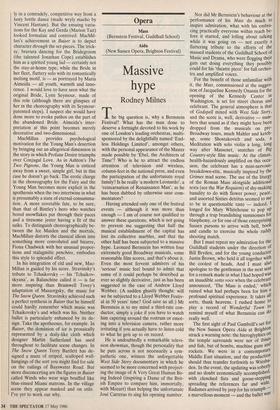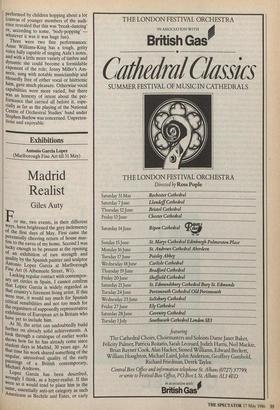Opera
Mass (Bernstein Festival, Guildhall School) Aida (New Sussex Opera, Brighton Festival)
Massive hype
Rodney Milnes
The big question is, why a Bernstein Festival? What has the man done to deserve a fortnight devoted to his work by one of London's leading orchestras, multi- sponsored by the delightfully named 'End- less Holdings Limited', amongst others, with the personal appearance of the Master made possible by 'Ebel, the Architects of Time'? Who is he to attract the endless attention of television and wireless, column-feet in the national press, and even the participation of the unfortunate royal family? Is he really 'a modern Leonardo', a `reincarnation of Renaissance Man', as he has been dubbed by otherwise sane com- mentators?
Having attended only one of the festival events — although it was more than enough — I am of course not qualified to answer these questions, which is not going to prevent me suggesting that half the musical establishment of the capital has lost its collective marbles, and that the other half has been subjected to a massive hype. Leonard Bernstein has written four extremely good Broadway musicals, some reasonable film scores, and that's about it. Even the most fervent admirers of his `serious' music feel bound to admit that some of it could perhaps be described as ever so slightly derivative, just as has been suggested in the case of Andrew Lloyd Webber. (A sudden ghastly thought: will we be subjected to a Lloyd Webber Festiv- al in 50 years' time? God save us all.) Mr Bernstein is to my mind a third-rate con- ductor, simply a joke if you have to watch him capering around the rostrum or emot- ing into a television camera, rather more irritating if you actually have to listen cold to what he gets up to on record.
He is undoubtedly a remarkable televi- sion showman, though the personality that he puts across is not necessarily a sym- pathetic one, witness the unforgettable West Side Story documentary in which he seemed to be more concerned with project- ing the image of A Very Great Human Be- ing Indeed (inspiring a Dame of the Brit- ish Empire to compare him, immortally, with Mozart) than helping the unfortunate Jose Carreras to sing his opening number. Nor did Mr Bernstein's behaviour at the performance of his Mass do much to inspire admiration, what with his embra- cing practically everyone within reach be- fore it started, and lolling about talking while it was going on — not exactly a flattering tribute to the efforts of the massed students of the Guildhall School of Music and Drama, who were flogging their guts out doing everything they possibly could for his 'theatre piece' for full orches- tra and amplified voices.
For the benefit of those unfamiliar with it, the Mass, commissioned at the sugges- tion of Jacqueline Kennedy Onassis for the opening of the Kennedy Center in Washington, is set for street chorus and celebrant. The general atmosphere is that of Godspell mixed with West Side Story, and the score is, well, derivative — num- bers that sound as if they might have been dropped from the musicals on pre- Broadway tours, much Mahler and ketch- up, some Shostakovich and soda, a Meditation with solo violin a long, long way after Massenet, snatches of Big Country-style film music. At the climax, health-hazardously amplified on this occa- sion, the celebrant has a mini-nervous- breakdown-ette, musically inspired by the Grimes mad scene. The use of the liturgy of the Roman Mass alongside additional texts (see the War Requiem) of shy-making banality to do with flower power, peace, and assorted Sixties detritus seemed to me to be in questionable taste — indeed, I longed for Mary Whitehouse to pop oP through a trap brandishing summonses for blasphemy, or for one of those enterprising Sussex parsons to arrive with bell, book and candle to exorcise the whole ruddy shooting match. But I must repeat my admiration for the Guildhall students under the direction of Bill Bryden, and for the young conductor Justin Brown, who held it all together with the coolest of heads, And I must also apologise to the gentleman in the next seat for a remark made in what I had hoped was an inaudible sotto voce when the celebrant announced, 'The Mass is ended,' which ruined what had perhaps been for him a profound spiritual experience. It takes all sorts, thank heavens. I rushed home to play a record of Wonderful Town to remind myself of what Bernstein can do really well. The first sight of Paul Gambrill's set for the New Sussex Opera Aida at Brighton struck a warning note: the hieroglyphics on the temple surrounds were not of ibises and fish, but of bombs, machine guns and rockets. We were in a contemporary Middle. East situation, and the production should thus transfer forthwith to Wiesba- den. In the event, the updating was soberly and no doubt economically accomplished, with clenched fists and goose-stepping spreading the references far and wide' Radames arrived by jeep for his triumph a marvellous moment — and the ballet was performed by children hopping about a lot (canvas of younger members of the audi- ence revealed that this was 'break-dancing' or, according to some, 'body-popping' whatever it was it was huge fun). There were two fine performances: Anne Williams-King has a tough, gritty voice fully capable of singing Aida's notes, and with a little more variety of timbre and dynamic she could become a formidable exponent of the role; Jenny Miller's Am- neris, sung with notable musicianship and blessedly free of either vocal or histrionic ham, gave much pleasure. Otherwise vocal capabilities were more varied, but there was an honesty of intent about the per- formance that carried all before it, espe- cially as far as the playing of the National Centre of Orchestral Studies' band under Stephen Barlow was concerned. Unpreten- tious and enjoyable.



















































 Previous page
Previous page